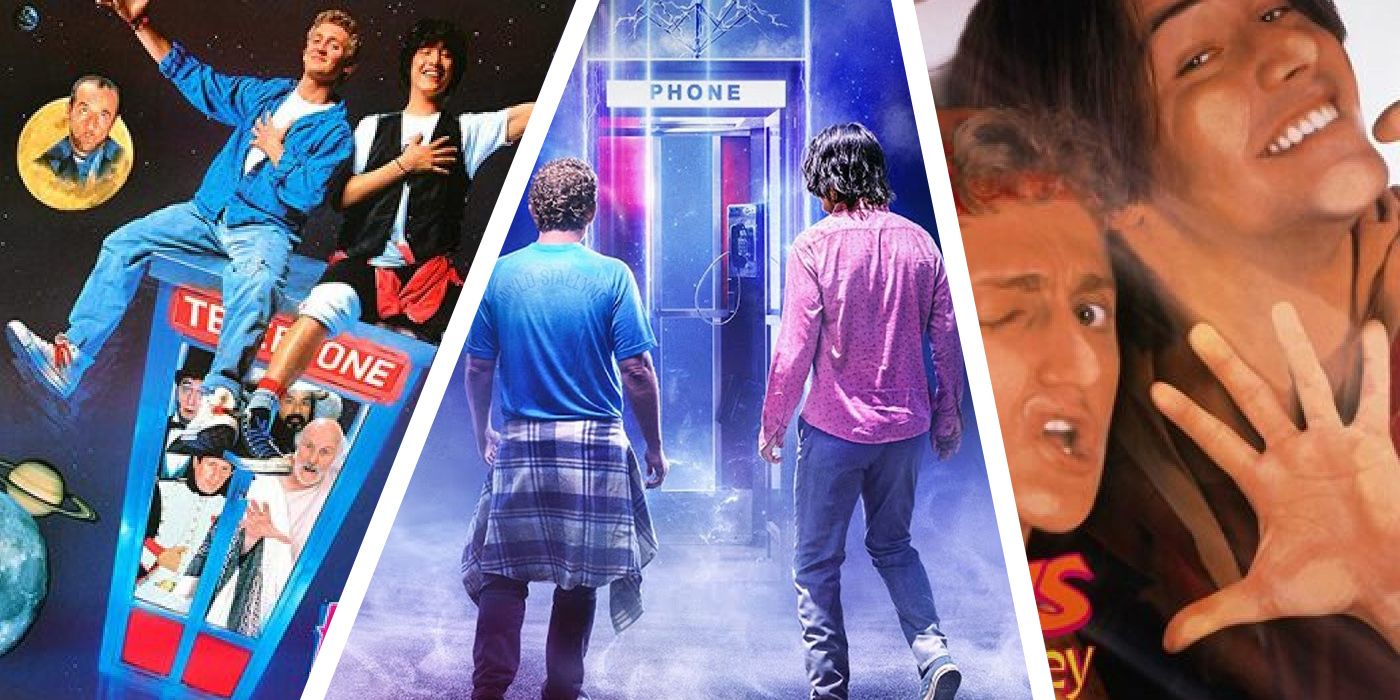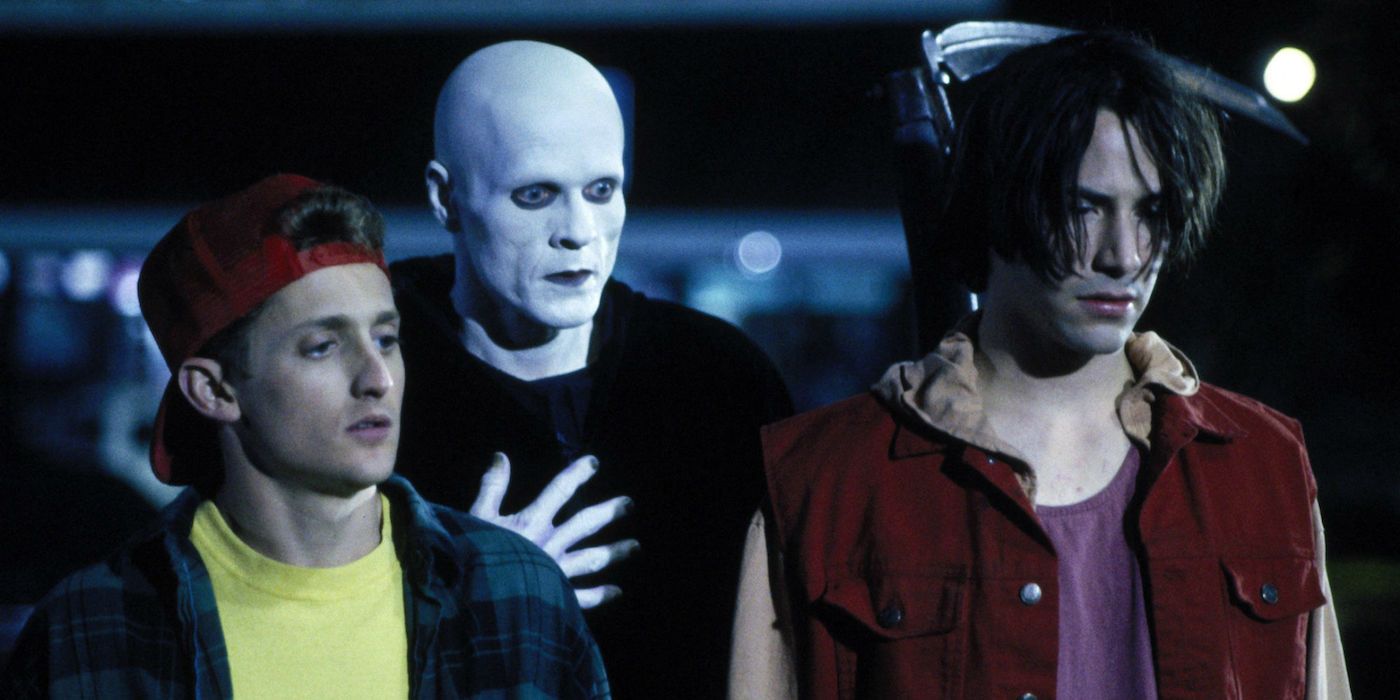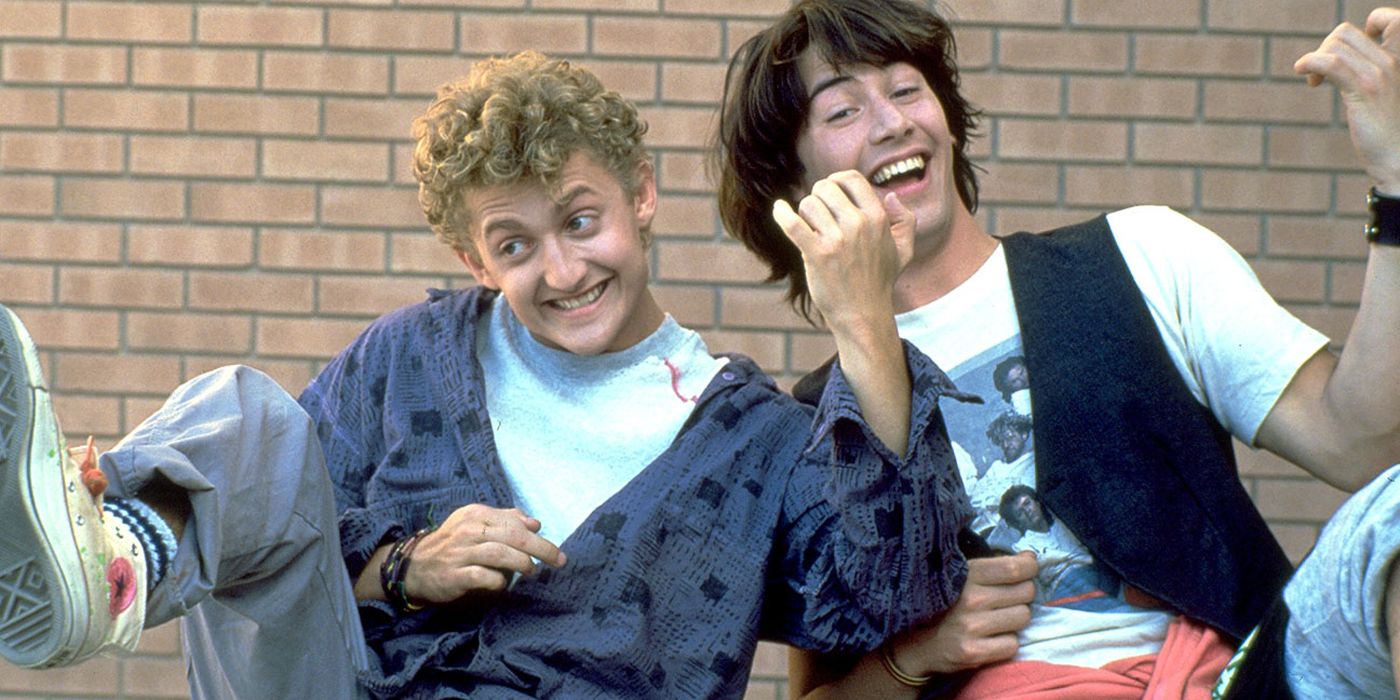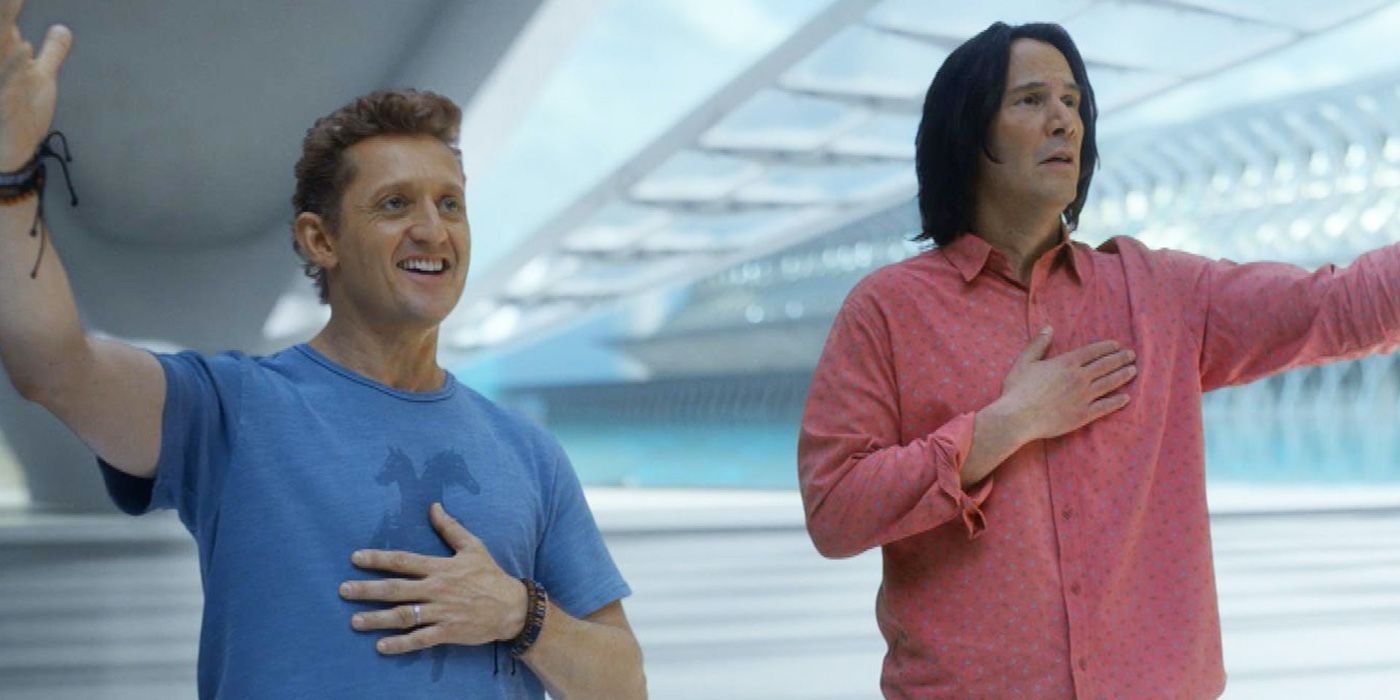Bill & Ted Face the Music has been widely praised by critics and streamers, and may lead fans back to the original franchise installments, Bill & Ted's Excellent Adventure and Bill & Ted's Bogus Journey. When assessing the overall quality of the Bill & Ted trilogy, "recency bias" comes into play, as people tend to favor a recent positive experience over one from the past. Bill & Ted Face the Music clearly makes 2020 moviegoers feel righteous, but does that reflect quality filmmaking?
In Bill & Ted Face the Music, Alex Winter and Keanu Reeves reprise their titular roles as the focal dudes, respectively. The dynamic duo, known to many as "Wyld Stallyns," need to produce a song that will seemingly change the world, but they don't necessarily understand the logistics. So, Bill and Ted travel to the future for answers, and their daughters go back in time to recruit musicians for a band. Bill & Ted Face the Music co-stars Samara Weaving (Ready or Not) as Bill's daughter Thea and Brigette Lundy-Paine (Atypical) as Ted's daughter Billie.
Each of the Bill & Ted films have uniquely different vibes. The original captures the spirit of late '80s SoCal culture, as the title characters are present in conversations but not quite connected to reality. In 1991, the sequel subverted expectations with a death premise and art house influences that didn't quite vibe with mainstream culture of the time. The third franchise installment captures the comedic energy of the first two films, and builds upon the main storyline by introducing the male protagonists' music-loving daughters; two quirky women who can handle themselves but feel inclined to help out their fathers in the name of universal harmony. Here's a ranking of the Bill & Ted films from worst to first.
3. Bill & Ted's Bogus Journey
Bill & Ted's Bogus Journey takes big risks but doesn't quite capitalize on the original film's momentum. For example, the initial flick leans heavily on the slacker premise, whereas the sequel embraces a surrealistic art house vibe. So, in terms of accessible family entertainment, Bill & Ted's Bogus Journey fails because its message is inherently dark, evidenced by the title itself, and because the charismatic leads are swapped for robots. Chris Matheson and Ed Solomon aim high as the franchise creators and screenwriters, but there's a pretentious feel that contrasts with the organic comedy of the original film.
On paper, characters named Evil Bill and Evil Ted seemingly reference the cultural paranoia that pervaded Ronald Reagan's '80s presidency while foreshadowing the alternative rock movement of the time. By 1991, bands like Pearl Jam and Nirvana were taking off, and Bill & Ted's Bogus Journey undoubtedly felt timely to many artists back then, especially those with an indie-minded sensibility who appreciated eclectic music and indie cinema. From a modern point of view, the millennial streamer with little to no understanding of '80s or early '90s pop culture may scoff at Bill & Ted's Bogus Journey, if only because the visual aesthetic feels dated and the references don't resonate. Oddly enough, though, the franchise sequel could become a popular streaming classic in the coming years, due to its original concepts and nostalgic value.
As a piece of filmmaking, Bill & Ted's Bogus Journey feels a bit messy at times and doesn't have that Friday Night Fun element that made the original movie so popular. It's evident that the cast and crew believed they were onto something big; yet, the overall filmmaking execution doesn't quite hit the mark.
2. Bill & Ted's Excellent Adventure
Bill & Ted's Excellent Adventure excels became of the original premise, the narrative structure, and the central performances. There's a clear flow from scene scene; Winter and Reeves portray aloof slackers who find meaning when they're visited by an eloquent gentleman from the future, and then travel through time in a phone booth. The incorporation of real-life historical figures captures an energy that's widely accessible for various demographics. Viewers don't necessarily need the full context for characters like Billy the Kid, Napoleon Bonaparte, and J0an of Arc — they just need a concept to grasp onto that relates to Bill and Ted's most excellent journey.
Performance is crucial to Bill & Ted's Excellent Adventure for two primary reasons. For one, Winter and Reeves were both relatively unknown in 1989, and so many moviegoers couldn't link them to other films. Winter had a supporting role in Lost Boys, but he wasn't the primary star. In the present, Reeves is well known as Neo from The Matrix and the title character from the John Wick franchise, but he was still an up-and-comer when Bill & Ted's Excellent Adventure released. The central duo's charisma and comedic energy fuel the film, which is critical because they mostly carry the load. Bill and Ted feel like real-life dudes who seem totally thrilled that they get to travel though wormholes. And because the premise is so weird, it's crucial to have leads who are weirdly believable.
The late George Carlin makes Bill & Ted's Excellent Adventure a timely classic. The iconic comedian provides emotional depth with his eloquent commentaries about space and time, which ironically ground the film as the events become more fantastical. Importantly, Carlin doesn't steal the film away from the two leads, but rather complements their career-changing performances. And so there's an endearing familial dynamic that shines though, one that the third installment so brilliantly builds upon quite literally by introducing Bill and Ted's equally bodacious daughters.
1. Bill & Ted Face the Music
Bill & Ted Face the Music utilizes the best elements of the original two movies for a timely story about connections in a time of crisis. The screenwriters (Matheson and Solomon) wisely focus on the protagonists' core personality traits and the fact that they're still struggling with their creative aspirations. Bill and Ted are indeed married, and both of them have loving children, but they're not defined by their roles as husbands and fathers. In a heartwarming twist, Bill's daughter Thea (Samara Weaving) and Ted's daughter Billie (Brigette Lundy-Paine) are similarly inspired by music and follow their own paths through time-bending wormholes.
As a message film, Bill & Ted Face the Music isn't didactic with its storytelling. The main dudes want to be the best versions of themselves, but know all too well that a simple twist of fate can change everything. There isn't a heavy sociopolitical commentary about American life under the presidency of Donald Trump, but rather a tale about the universal power of music and how proactive behavior can bring people together. Even though Bill & Ted Face the Music partially relies on the narrative structure of the original film by incorporating historical figures, it still feels wholly original and fresh; a perfect film for locked-down streamers.
In a surprising turn of events, Bill & Ted Face the Music's ending positions Weaving and Lundy-Paine as the potential stars of a fourth installment or franchise spinoff. The screenwriters also make the ending cryptic enough to suggest that anything can happen moving forward, though it seems that the third movie marks the ending of a proper movie trilogy. Due to the time-shifting premise, the Bill & Ted franchise still has major potential moving forward, as Winter and Reeves don't necessarily need to star in future films.




